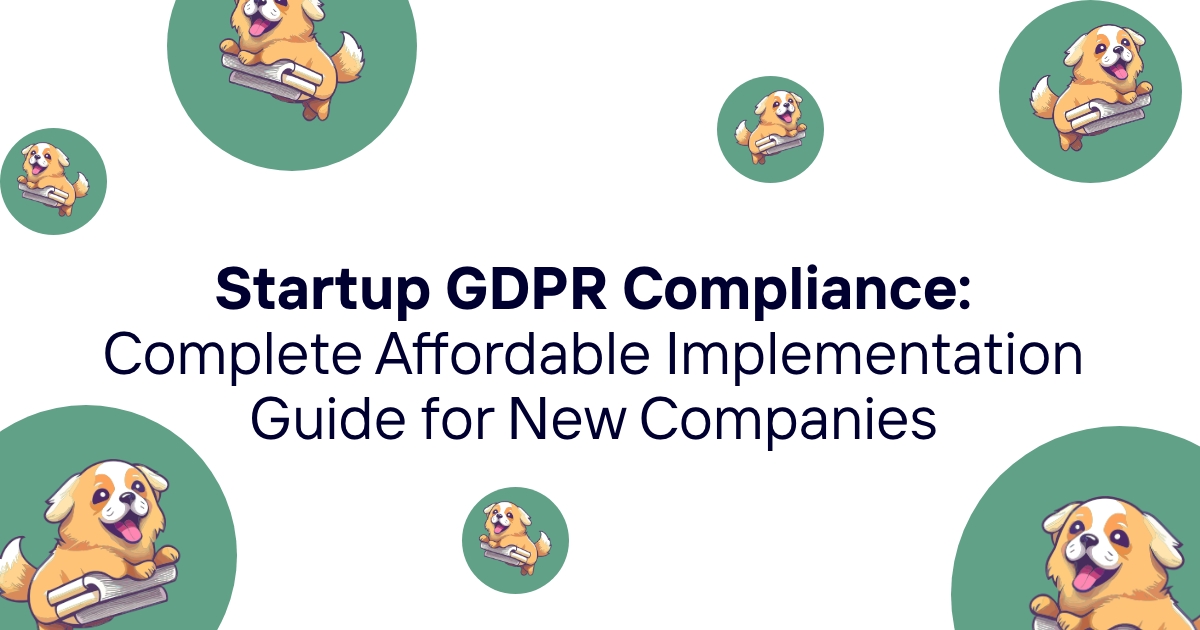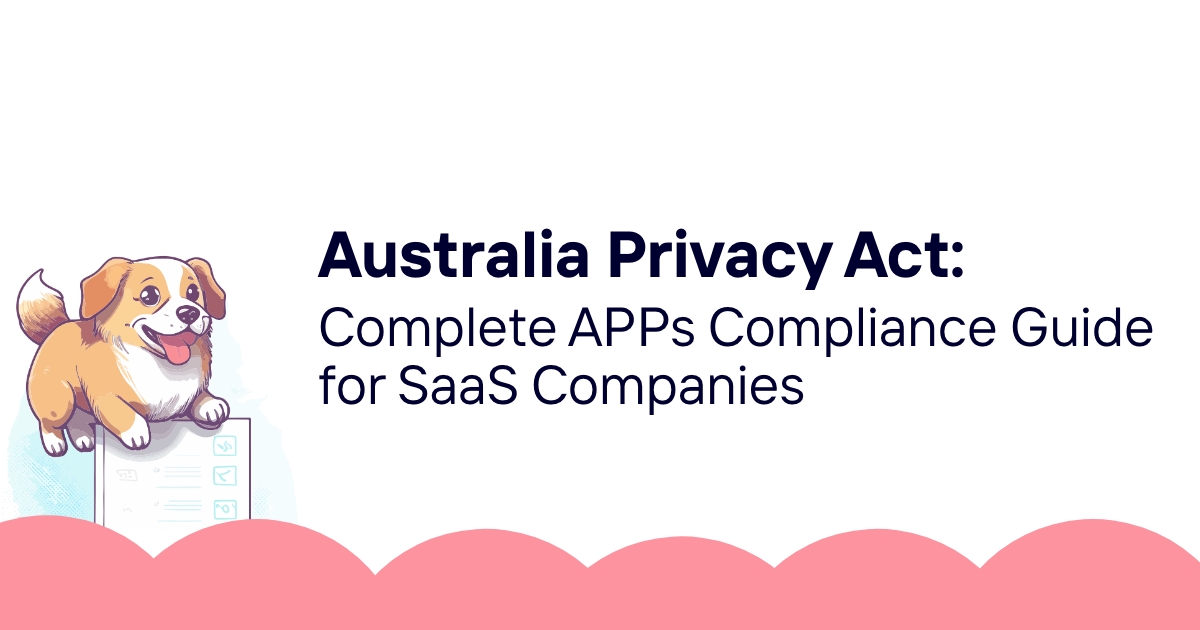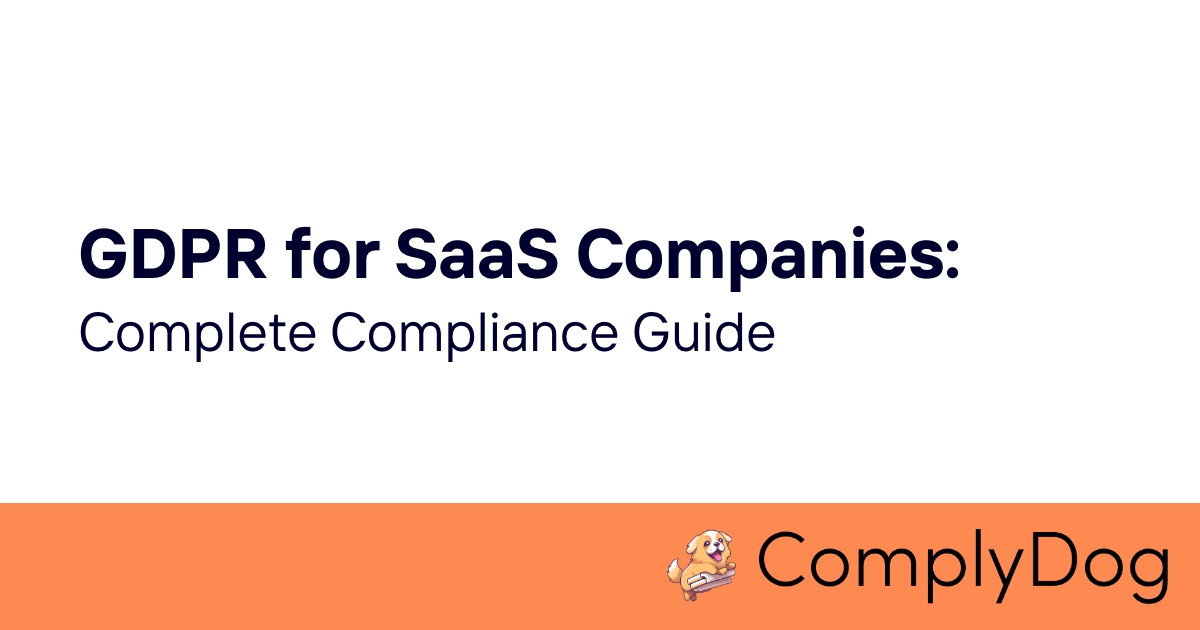Startup companies face unique GDPR compliance challenges that require balancing comprehensive privacy protection with limited resources, rapid growth trajectories, and evolving business models while ensuring data protection doesn't constrain innovation or customer acquisition. Early-stage companies must implement privacy frameworks that scale efficiently without overwhelming operational capacity or development timelines.
The complexity of startup GDPR compliance lies in building privacy protection into rapidly evolving products and services while maintaining the agility and speed that enables startup success. Traditional compliance approaches designed for established enterprises often prove too resource-intensive and rigid for startup environments that require flexible, cost-effective privacy solutions.
Startups serving European markets or processing EU resident data must achieve full GDPR compliance regardless of company size, making privacy protection a critical business requirement rather than optional enhancement. However, smart implementation strategies can make GDPR compliance affordable and manageable for resource-constrained new companies.
The most successful startups view GDPR compliance as competitive advantage rather than burden, using privacy protection to build customer trust, differentiate from competitors, and prepare for international expansion that positions them for long-term success in global markets.
Proper startup GDPR implementation requires understanding which privacy controls are essential versus nice-to-have while building scalable frameworks that grow with business expansion and evolving customer needs throughout startup development phases.
ComplyDog helps startups implement affordable GDPR compliance through streamlined assessment, essential control implementation, and scalable privacy frameworks that protect customer data while supporting rapid growth and business agility.
Essential GDPR Requirements for Startups
Understanding core GDPR requirements enables startups to focus implementation efforts on essential privacy protection while avoiding unnecessary complexity and resource allocation during critical early-stage development periods.
Fundamental Privacy Principles for Startups:
GDPR's core principles - lawfulness, fairness, transparency, purpose limitation, data minimization, accuracy, storage limitation, and accountability - provide foundational privacy guidance that startups must embed throughout business operations and product development.
Implement privacy principles through simple policies and procedures that provide clear guidance for staff while ensuring comprehensive coverage of essential privacy requirements without overwhelming operational capacity.
Legal Basis Determination for Early-Stage Companies:
Startups must identify appropriate legal basis for all personal data processing including customer acquisition, product development, marketing activities, and business operations while ensuring clear documentation and customer communication.
Focus on legitimate interests and consent as primary legal bases while ensuring appropriate balancing tests and consent management that support business operations without creating unnecessary complexity.
Data Subject Rights Implementation:
GDPR provides individuals with extensive rights including access, rectification, erasure, portability, and objection that startups must support through appropriate systems and procedures regardless of company size or resource constraints.
Design simple but effective rights management processes that can handle customer requests efficiently while ensuring comprehensive coverage and regulatory compliance throughout startup operations.
Privacy Policy and Transparency Requirements:
Startups must provide clear privacy notices that explain data processing in accessible language while ensuring comprehensive coverage of all processing activities and appropriate customer communication about privacy practices.
Create straightforward privacy policies that address all GDPR requirements while remaining accessible to customers and avoiding unnecessary legal complexity that might confuse users or overwhelm development resources.
Data Protection Officer (DPO) Considerations:
Most startups don't require formal DPO appointment, but should designate privacy responsibility and build privacy expertise throughout organizations while preparing for potential DPO requirements as businesses scale.
For insights on building cost-effective privacy frameworks, check out our SaaS internal privacy controls guide which addresses similar resource-efficient privacy implementation challenges.
Cost-Effective Privacy Implementation Strategies
Implementing GDPR compliance cost-effectively requires strategic prioritization of essential privacy controls while building scalable frameworks that grow with startup development and business expansion.
Privacy by Design for Resource-Constrained Startups:
Implement privacy by design principles through development practices that embed privacy protection into product architecture and business processes without requiring extensive additional resources or development overhead.
Design privacy protection into core business processes and technology architecture from inception rather than retrofitting compliance, reducing long-term costs while ensuring comprehensive protection.
Open Source and Free Privacy Tools:
Leverage open source privacy tools, free compliance resources, and community-supported solutions that provide essential privacy functionality without requiring substantial software licensing or subscription costs.
Evaluate free privacy management tools, open source consent management platforms, and community-developed compliance resources that support startup privacy implementation within budget constraints.
Automated Privacy Control Implementation:
Implement automated privacy controls that reduce ongoing operational overhead while ensuring consistent privacy protection throughout business operations and customer interactions.
Focus on automation for consent management, data retention, and basic rights processing that provides scalable privacy protection without requiring dedicated privacy staff or extensive manual processes.
Scalable Privacy Framework Design:
Design privacy frameworks that start simple but scale efficiently as businesses grow, avoiding over-engineering while ensuring foundations support future expansion and increased compliance requirements.
Build privacy management approaches that can accommodate rapid growth, new product development, and expanding customer bases without requiring complete redesign of privacy protection systems.
Strategic Privacy Investment Prioritization:
Prioritize privacy investments based on business risk, customer expectations, and regulatory requirements while ensuring essential protection without overwhelming startup budgets or operational capacity.
Lean Privacy Management Approaches
Adopting lean privacy management enables startups to achieve comprehensive GDPR compliance while maintaining operational efficiency and resource allocation that supports core business development and growth objectives.
Minimum Viable Privacy (MVP) Implementation:
Develop minimum viable privacy implementations that provide essential GDPR compliance while avoiding unnecessary complexity and resource allocation during critical startup development phases.
Focus on core privacy requirements that provide regulatory compliance and customer trust while deferring advanced privacy features until business growth justifies additional investment.
Agile Privacy Development:
Implement agile privacy development approaches that integrate privacy protection with existing development methodologies while ensuring privacy considerations don't disrupt development velocity or product iteration cycles.
Design privacy implementation that supports rapid development cycles while ensuring comprehensive protection through iterative privacy enhancement and continuous improvement approaches.
Cross-Functional Privacy Integration:
Integrate privacy responsibilities across existing roles rather than hiring dedicated privacy staff, building privacy competency throughout organizations while managing resource constraints effectively.
Train existing staff on privacy requirements while distributing privacy responsibilities across development, customer service, and business operations to ensure comprehensive coverage without dedicated resources.
Privacy Debt Management:
Manage privacy debt systematically by identifying areas where privacy implementation is deferred while ensuring appropriate documentation and remediation planning that addresses privacy gaps efficiently.
Track privacy implementation gaps while planning systematic remediation that aligns with business growth and resource availability for sustainable privacy improvement.
Rapid Privacy Assessment Techniques:
Develop rapid privacy assessment techniques that identify essential privacy requirements and implementation priorities while avoiding extensive analysis that might delay business development or product launches.
Essential Privacy Tools and Technologies
Implementing essential privacy tools and technologies enables startups to achieve GDPR compliance efficiently while building scalable privacy infrastructure that supports business growth and customer trust development.
Basic Consent Management Implementation:
Implement basic consent management that captures, tracks, and manages customer consent effectively while ensuring GDPR compliance without requiring complex consent management platforms or extensive development resources.
Focus on simple consent implementation that provides clear customer choice while ensuring appropriate documentation and consent withdrawal mechanisms that support regulatory compliance.
Data Mapping and Inventory Tools:
Use simple data mapping tools that identify and track personal data throughout startup operations while ensuring comprehensive coverage of data processing activities without requiring extensive documentation overhead.
Implement basic data inventory approaches that provide visibility into data processing while supporting privacy policy development and data subject rights management through systematic data tracking.
Privacy Policy Generation and Management:
Leverage privacy policy generators and templates that provide GDPR-compliant privacy notices while ensuring appropriate customization for specific business models and data processing activities.
Use cost-effective privacy policy tools that provide regulatory compliance while ensuring policies remain accurate and accessible to customers throughout business development and expansion.
Simple Rights Management Systems:
Implement simple rights management systems that handle data subject requests efficiently while ensuring comprehensive coverage of GDPR rights without requiring complex customer portal development.
Design basic rights processing that provides regulatory compliance while minimizing operational overhead through streamlined request handling and response procedures.
Essential Security and Encryption:
Implement essential security and encryption measures that protect personal data effectively while ensuring appropriate protection levels without requiring extensive security infrastructure or specialized expertise.
Focus on fundamental security controls including encryption, access management, and secure communications that provide privacy protection within startup technology and resource constraints.
Scalable Privacy Documentation
Developing scalable privacy documentation ensures that startups maintain comprehensive compliance records while building documentation frameworks that grow efficiently with business expansion and evolving privacy requirements.
Streamlined Policy Development:
Develop streamlined privacy policies and procedures that provide comprehensive coverage while remaining manageable for small teams and avoiding unnecessary complexity that might overwhelm operational capacity.
Create policy frameworks that address essential privacy requirements while ensuring practical implementation and staff understanding through clear, actionable privacy guidance.
Essential Documentation Templates:
Use essential documentation templates that provide GDPR compliance while ensuring appropriate customization for specific business needs and avoiding extensive documentation development overhead.
Leverage compliance templates for privacy policies, data processing records, and consent documentation that provide regulatory compliance while supporting efficient implementation.
Documentation Automation Strategies:
Implement documentation automation that maintains accurate privacy records while reducing manual effort and ensuring comprehensive documentation throughout business operations and development activities.
Focus on automated documentation generation for data processing activities, consent records, and privacy policy updates that provide compliance support without requiring dedicated documentation resources.
Version Control and Change Management:
Establish simple version control and change management for privacy documentation while ensuring appropriate document accuracy and regulatory compliance throughout policy updates and business changes.
Design documentation management that maintains compliance while supporting business agility through efficient change management and document version control procedures.
Audit-Ready Documentation Preparation:
Prepare audit-ready documentation that demonstrates GDPR compliance while ensuring appropriate evidence collection and record maintenance that supports regulatory accountability without extensive preparation overhead.
Privacy Training and Culture Building
Building privacy awareness and culture enables startups to achieve comprehensive privacy protection while ensuring staff competency and organizational commitment to privacy throughout business operations and customer interactions.
Essential Privacy Training for Small Teams:
Develop essential privacy training that builds necessary competency while ensuring comprehensive coverage of privacy requirements without overwhelming training capacity or operational resources.
Focus on practical privacy education that provides actionable guidance while building privacy awareness and competency throughout startup teams and operational functions.
Privacy Culture Development:
Build privacy culture throughout startup organizations while ensuring shared understanding and commitment to privacy protection through leadership commitment and organizational value integration.
Design culture development that promotes privacy awareness while supporting business objectives through systematic privacy culture building and value integration approaches.
Role-Based Privacy Responsibility:
Assign role-based privacy responsibilities throughout organizations while ensuring appropriate coverage of privacy requirements without requiring dedicated privacy roles or extensive organizational restructuring.
Distribute privacy responsibilities across existing roles while providing clear guidance and accountability for privacy protection throughout business operations and customer interactions.
Ongoing Privacy Education:
Implement ongoing privacy education that maintains competency while ensuring continued awareness and skill development throughout business growth and evolving privacy requirements.
Design education programs that provide systematic privacy learning while supporting professional development through continuous privacy education and awareness building.
Privacy Decision-Making Integration:
Integrate privacy considerations into business decision-making while ensuring appropriate privacy input and evaluation throughout strategic planning and operational decision processes.
Startup Growth and Privacy Scaling
Planning privacy scaling ensures that startups can maintain GDPR compliance while growing rapidly and expanding into new markets, products, and customer segments throughout business development phases.
Privacy Scaling Milestones:
Establish privacy scaling milestones that identify when additional privacy investment becomes necessary while ensuring appropriate planning and resource allocation for privacy enhancement throughout business growth.
Plan privacy scaling that aligns with business milestones while ensuring comprehensive protection and regulatory compliance throughout expansion and development phases.
International Expansion Privacy Preparation:
Prepare for international expansion by building privacy frameworks that support multiple jurisdictions while ensuring appropriate compliance planning for global market entry and customer base expansion.
Design privacy frameworks that support international business while ensuring appropriate compliance preparation for different regulatory requirements and market expansion strategies.
Product Development Privacy Integration:
Integrate privacy considerations into product development while ensuring appropriate privacy protection and compliance throughout new product launches and feature development activities.
Plan product privacy that supports innovation while ensuring comprehensive protection and regulatory compliance throughout product development and customer value creation.
Team Growth and Privacy Competency:
Plan team growth that maintains privacy competency while ensuring appropriate expertise and responsibility allocation throughout organizational expansion and staff development.
Design organizational growth that supports privacy protection while building necessary competency and capability throughout team expansion and role development.
Technology Infrastructure Privacy Scaling:
Scale technology infrastructure while maintaining privacy protection and ensuring appropriate security and compliance throughout system expansion and capacity development.
Plan infrastructure scaling that supports business growth while maintaining comprehensive privacy protection and regulatory compliance throughout technology expansion and enhancement.
Ready to build GDPR compliance that grows with your startup? Use ComplyDog and implement affordable privacy protection that transforms compliance from startup burden into competitive advantage through cost-effective, scalable privacy frameworks designed for rapid growth and resource efficiency.


















